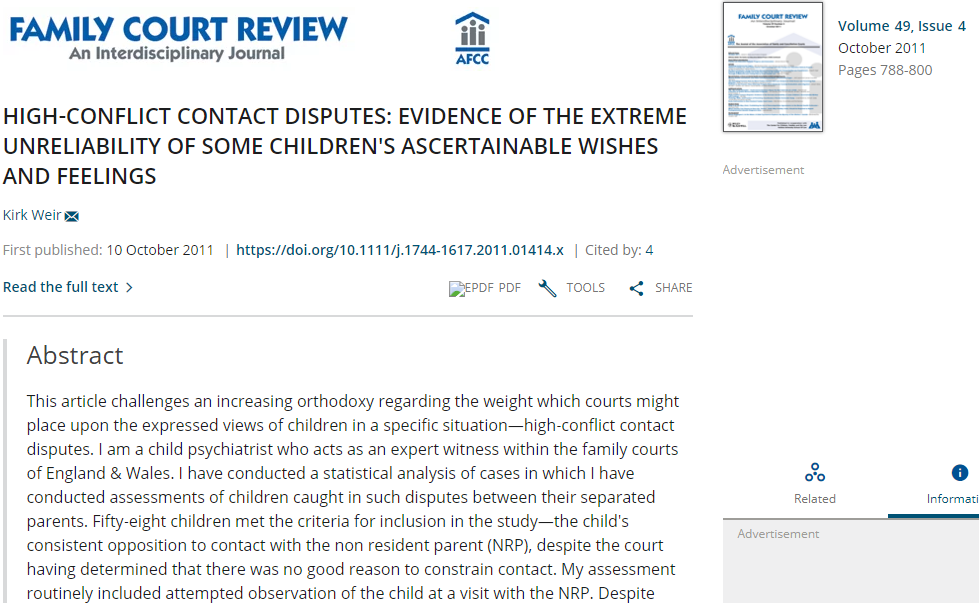If you're new here, you may want to subscribe to my RSS feed. Thanks for visiting!
This research paper’s findings speak for themselves. It was authored by “a child psychiatrist who acts as an expert witness within the family courts of England & Wales“.
Here’s an excerpt from his conclusion that I found powerfully compelling, and highly noteworthy:
“I conclude that courts might exercise caution when evaluating the views of children and young people in this situation, and emphasises that assessors should consider including at least one observation of the child at a prolonged visit to the NRP. Because of the new orthodoxy some parents may be tempted to misuse their child’s right to a “voice” in court in order to achieve their own ends. Practitioners who advise courts may need to be more aware of these difficulties” – Kirk Weir, Child Psychiatrist and Author of the Reviewed Paper
I preview/link to it below, as a follow up to the preceding recommended article that discusses “when kids lie, why they lie etc (which is also linked to at the bottom of the page”.
====
HIGH‐CONFLICT CONTACT DISPUTES: EVIDENCE OF THE EXTREME UNRELIABILITY OF SOME CHILDREN’S ASCERTAINABLE WISHES AND FEELINGS
Abstract
This article challenges an increasing orthodoxy regarding the weight which courts might place upon the expressed views of children in a specific situation—high‐conflict contact disputes. I am a child psychiatrist who acts as an expert witness within the family courts of England & Wales. I have conducted a statistical analysis of cases in which I have conducted assessments of children caught in such disputes between their separated parents.
Fifty‐eight children met the criteria for inclusion in the study—the child’s consistent opposition to contact with the non resident parent (NRP), despite the court having determined that there was no good reason to constrain contact.
My assessment routinely included attempted observation of the child at a visit with the NRP. Despite their stated views most children had a positive experience in those visits that took place, and despite the fact that most had not seen the NRP for a long time. Overall there was a statistical association between increased resistance to contact and the greater age of the child and the longer the time during which no contact had occurred.
However, the responses of children and young people were unpredictable and it was impossible to conclude that apparent maturity or intelligence was a guide to the reliability of their expressed resistance. The possible reasons for this unreliability are discussed.
I emphasize that my sample of children is unusual as many of the cases had involved serious, though unfounded, allegations of abuse. In addition most of the children showed indications of having become “alienated” from the NRP.
I conclude that courts might exercise caution when evaluating the views of children and young people in this situation, and emphasises that assessors should consider including at least one observation of the child at a prolonged visit to the NRP. Because of the new orthodoxy some parents may be tempted to misuse their child’s right to a “voice” in court in order to achieve their own ends. Practitioners who advise courts may need to be more aware of these difficulties.
Continue reading…
https://onlinelibrary.wiley.com/doi/full/10.1111/j.1744-1617.2011.01414.x

